QuestionI have a 6 yr old ferret named wiggles. I just recently adopted him from a friend and he had a small bald spot and within the last 4 months he has lost almost all his hair but its starting to grow back. I took him to the vet and they didnt think it was adrenal disease. I asked his previous owner if this had happened before and she said yes when she moved to virginia and when she moved into a new apartment. I was just wondering if the stress of moving and being adpoted could have caused the hair loss? I have changed his diet and changed his shampoo bc I thought that could have caused the hair loss. I am really worried about my Wiggles. Please help! thank you
AnswerHi Erin:
This breaks my heart to tell you, but there is no diet change, shampoo, or emotional upset that can cause fur loss in ferrets. Fur loss is caused by hormonal changes. Hormonal changes are caused by fluctuations in adrenal gland functioning. It is actually not very unusual for a ferret to go bald, grow its fur back, maybe even for a year or two, before he loses it again and the baldness returns a second or even third time. Eventually the baldness comes back to stay in every case I have heard of and it has always turned out to be adrenal disease in every case I've heard of. I'm just not aware of any other reason a ferret would lose fur. Unfortunately, adrenal problems in ferrets usually mean a surgery is in the ferret's immediate future (if he's lucky enough to have someone to love him and care for him).
Unfortunately, if the ferret loses his fur the first time, then grows it back, the owner often has a false feeling of security and thinks the ferret is healthy. Meanwhile, the ferret *may* be working on a tumor deep inside within the adrenal glands. This extra year, two or three is a long time for that tumor to grow and possibly even spread to other organs of the body where it is not as easily removed as adrenal tumors.
The only cure for adrenal tumors is surgical removal. Your ferret is six years old, which is considered "elderly" in ferret years, although I have heard of ferrets living to be 10 or 12 years old (not commonly though). If he is in good health, you should definitely consider having him evaluated as a surgical candidate (get blood tests, etc to be sure his little body is in good overall health before starting). If he his healthy, the sooner the better to schedule surgery with your ferret vet to have the tumor/s removed.
If Wiggles is NOT a surgical candidate, there is a drug called "lupron" that can be given in 'depot' injections several times a year. These injections will relieve the SYMPTOMS ONLY of adrenal disease. LUPRON WILL NOT CURE ADRENAL TUMORS. It will, however, allow the ferret to be as comfortable as possible until the tumors (or other health problems) take the ferrets life. Lupron will help alleviate the symptoms that accompany adrenal disease such as fur loss, intense itching & skin dryness, swollen prostate in males, and swollen vulva in females. Without lupron injections, a ferret with adrenal disease would be very very uncomfortable, eventually losing all fur, scratching until skin is very scabby and sore, straining and sometimes unable to urinate to the point of having to be catheterized to relieve pressure on the bladder. Since Wiggles is a 6-year old male, you need to be extra extra watchful when he is in the litterbox - does he stay longer than usual? Does he appear to be straining? It may be a good idea occasionally when you are just sitting watching TV or something when you can somewhat watch him - pick up his litterbox when he's out playing and put down some newspapers/paper towels instead so you can see HOW MUCH pee he is actually passing. What I noticed with my male ferret with adrenal disease was that he dribbled for about a 3-ft long line instead of peeing a puddle. Also, he strained a lot before peeing. These are serious complications owners of male ferrets must be prepared to watch for at the first signs of adrenal tumors. Ultimately if a ferret is unable to urinate, the tummy may become tight and tender and he may be completely unable to urinate. Just a suggestion: if in doubt and his tummy is tight, *assume* it's his bladder and get him to a vet ASAP since you know he has adrenal disease now.
I actually have a ferret myself who just had adrenal surgery in December 2007. My vet could only locate the left adrenal gland and it was not very enlarged; she could not even find the right gland. These are typically about the size of the tip of a ballpoint pen, so "tiny" would describe a 'normal adrenal gland'. Anyway, after going thru the surgery, he continues to lose fur and scratch like crazy, so I now have him on lupron injections to relieve the symptoms he is experiencing, even tho his adrenal gland that WAS removed was not that large and the other one could not even be located. The bottom line is that the adrenal glands are what causes fur loss, dry skin and itchiness. Sometimes even surgical removal does not relieve the symptoms (but USUALLY it does). Lupron will NOT CURE adrenal disease, but it will relieve the symptoms that make the ferret so very uncomfortable.
If your ferret is "old" for six years old (sleeps a lot, overweight, not very active), you may choose to just treat him with lupron injections for a year or two rather than put him through a major surgery. Your vet would be the best to advise you on your ferret's likely life span and whether he is a good surgical candidate or if you should just put him on lupron and keep him comfortable as long as you can, then help him cross the Bridge when the time comes.
There are so many decisions to be made when our ferrets get older and those end-of-life illnesses, surgeries and decisions have to be made. It's always a good idea to discuss them with your vet long before you have to make the decisions. Make sure you know ALL your options and what the consequences of each option are. Now is when you are going to want to be SURE you have a really good ferret vet. Since you are fairly new as a ferret mom, I will give you some lists of ferret vets compiled by ferret owners from all over the world. This is a good way to try to locate a ferret vet in your area - wherever you live. Hope there is one on one or more of these lists near you:
VETS CANADA:
* http://www.ferretrescue.ca/start.php
* http://tinylink.com/?TlVyYKa6e0
* http://www.ferrets.org/Veterinarian_Listings.htm (British Columbia)
* http://www.ferretcentral.org/for-others/db-vets.html
* http://pets.groups.yahoo.com/group/sask_ferrets/
* http://noahsarkpetsandsupplies.com/index.html
VETS USA:
* http://www.quincyweb.net/quincy/vet.html
* http://ferrethealth.org/vets/
* http://www.ferret-universe.com/vets/vetlist.asp
* http://www.ferretsanctuary.com/vets.shtml
* http://www.ferretcentral.org/for-others/db-vets.html
* http://ferrethealth.org/vets/
VETS UK & IRELAND:
* http://homepage.ntlworld.com/ferreter/vetlist.htm
VET INFO/ LIST OF FERRET GROUPS/ CONTACTS IN UK, ITALY, NEW ZEALAND, AUSTRALIA, NETHERLANDS, GERMANY & DENMARK:
* http://www.ferretcentral.org/for-others/db-overseas.html (scroll down page to find the one you are looking for)
Here are some links to information on adrenal disease. You should try to learn all you can about it so you can ask your vet to clarify anything you need to know when you take Wiggles in for his vet appointment:
* http://www.petcarevabeach.com/adr.html
LUPRON as treatment:
* http://miamiferret.org/fhc/lupron.htm
ADRENAL CRYOSURGERY:
* http://www.miamiferret.org/fhc/cryosurgery.htm
Hopefully this information will help you make some decisions on how you can best help your ferret back to being comfortable. You are going to need to learn how to care for a sick ferret, including feeding 'soup', giving fluids like pedialyte, medication tips, etc. There is a great book called FERRETS FOR DUMMIES by Kim Schilling that has so much information in it - that would be a great help if you can get it. You can also get more information here:
http://www.ferretcentral.org/faq/index.html
Scroll down to PART 12 to read all about how to care for a sick/recovering ferret; and Part 13 tells even more about adrenal disease.
I know this is a lot to have to learn all at once. You've taken on quite a responsibility when you adopted Wiggles! You must be a really incredible person. OR, possibly you didn't know what you were getting onto. IF that is the case & you are feeling overwhelmed by all this, please don't panic. Just let me know and we can find someone in your area to help you with Wiggles, or take responsibility of Wiggles if you cannot.
I hope you will write again and let me know how I can help. Wiggles is one lucky little guy to have found his way to you. I have held every one of my ferrets as they drew their last breath and I can assure you, those last years, months, days, hours and minutes are so very precious. Ferrets are so appreciative of the little things like a bit of warm soup when they aren't feeling well - it's really incredible to share these special moments with them. Treasure every moment and every experience you have together - take lots of pictures and give him twice as many hugs as normal and you will both get through this just fine...I promise. I will help any way I can - just let me know how I can help, okay?
Sincerely,
Jacquie Rodgers

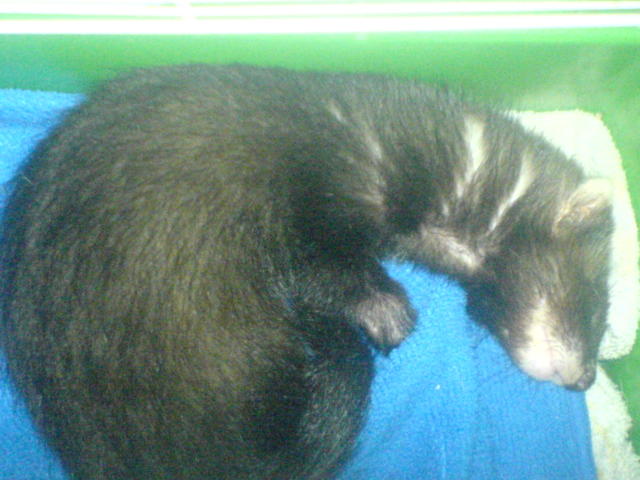 ferret breeds and behaviour
Question
Oscar
hey, i got an 11 week old hob called Osc
ferret breeds and behaviour
Question
Oscar
hey, i got an 11 week old hob called Osc
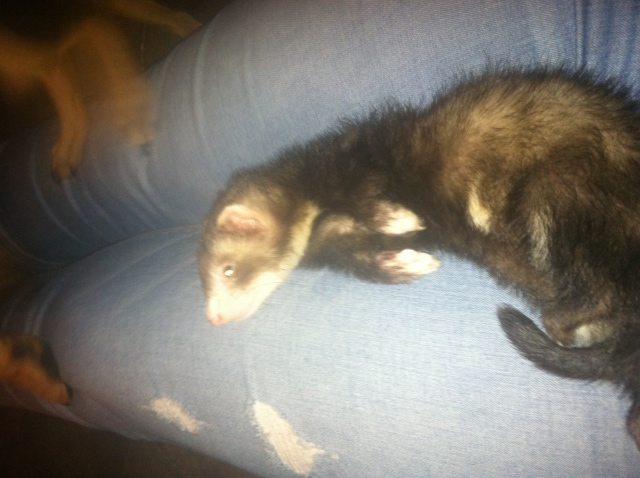 New ferret
Question
Franko the ferret
Hello,
I just boug
New ferret
Question
Franko the ferret
Hello,
I just boug
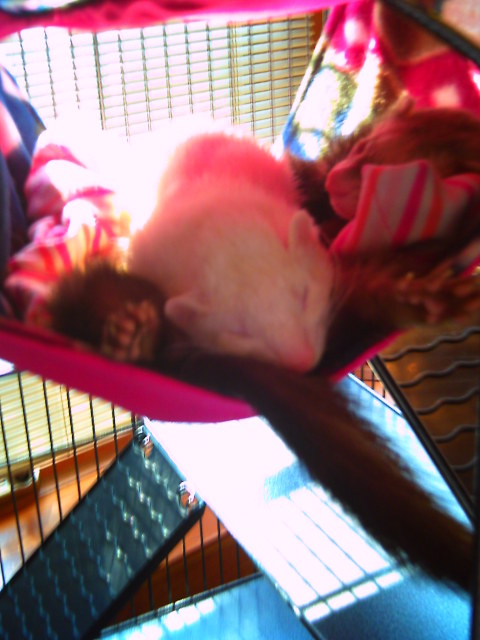 How do you think Isis is?
QuestionCookie and Isis :)
QUESTION: Hello. :)
How do you think Isis is?
QuestionCookie and Isis :)
QUESTION: Hello. :)
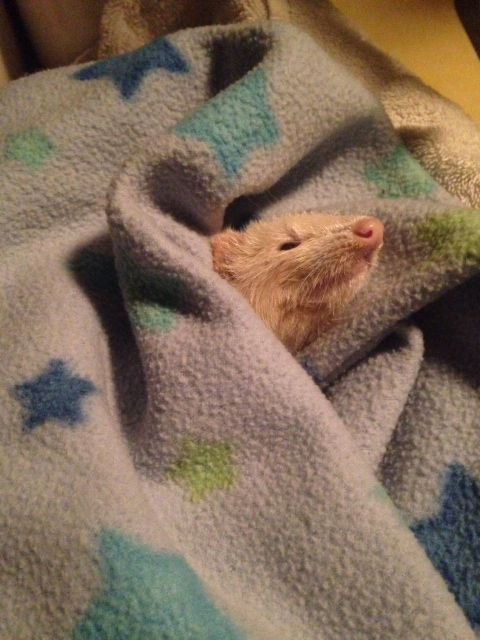 My ferrets die
Question
Mia
My ferret die lest nite she was ten
My ferrets die
Question
Mia
My ferret die lest nite she was ten
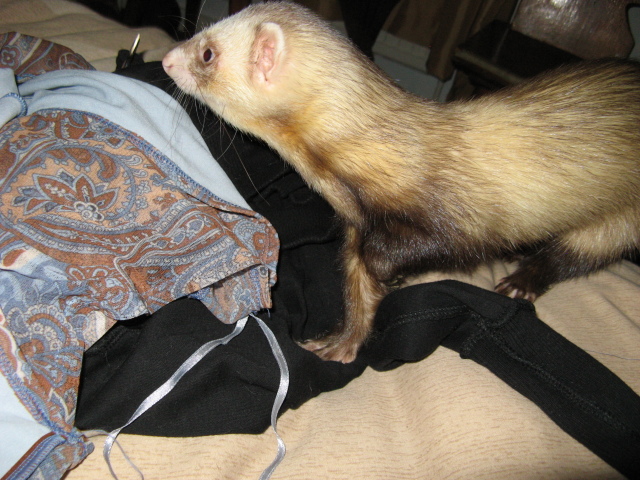 I think my ferret is to thin?
Question
Photo of Ferret
Hi
I think my ferret is to th
I think my ferret is to thin?
Question
Photo of Ferret
Hi
I think my ferret is to th